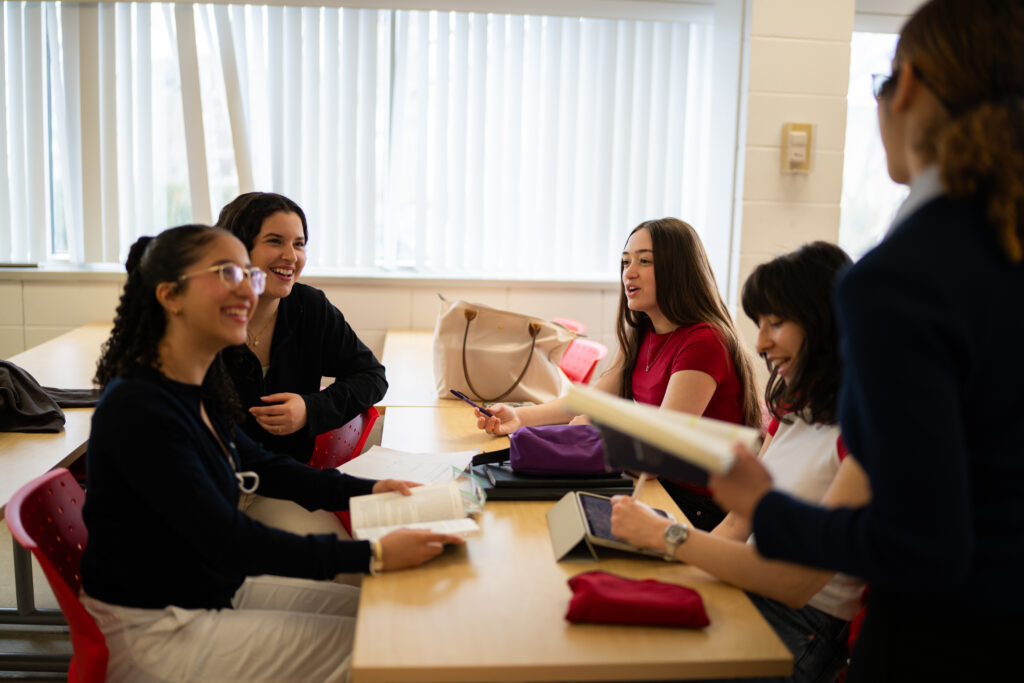200.16 - Double DECs
Double DEC Science + ALC
The Double DEC in Science and Arts, Literature & Communication (ALC) allows students to combine scientific analysis with cultural and communication skills.
Admission
- Fall
Duration
- 3 years
Interests
- Science
- Arts & Literature
- Languages
- Communications
- Culture
- Health, Wellness & the Body
Requirements
- Chemistry 534 or equivalent
- Physics 534 or equivalent
- Math TS or SN 5
What You Can Expect from the Program
The Double DEC in Science and Arts, Literature and Communications (ALC) offers a unique interdisciplinary education that combines the analytical precision of the sciences with the cultural and communicative insights of the arts. This program blends scientific reasoning and critical thinking with strong communication and cultural awareness. An education in both science and arts will help you build the hard and soft skills you need to adapt to a changing world.
The Double DEC program also features a reduced course load compared to a single DEC. This lighter load allows students more time to focus on each course. Additionally, the extended timeline provides valuable opportunities for students to further discover their interests and improve their English-language skills before going to university.
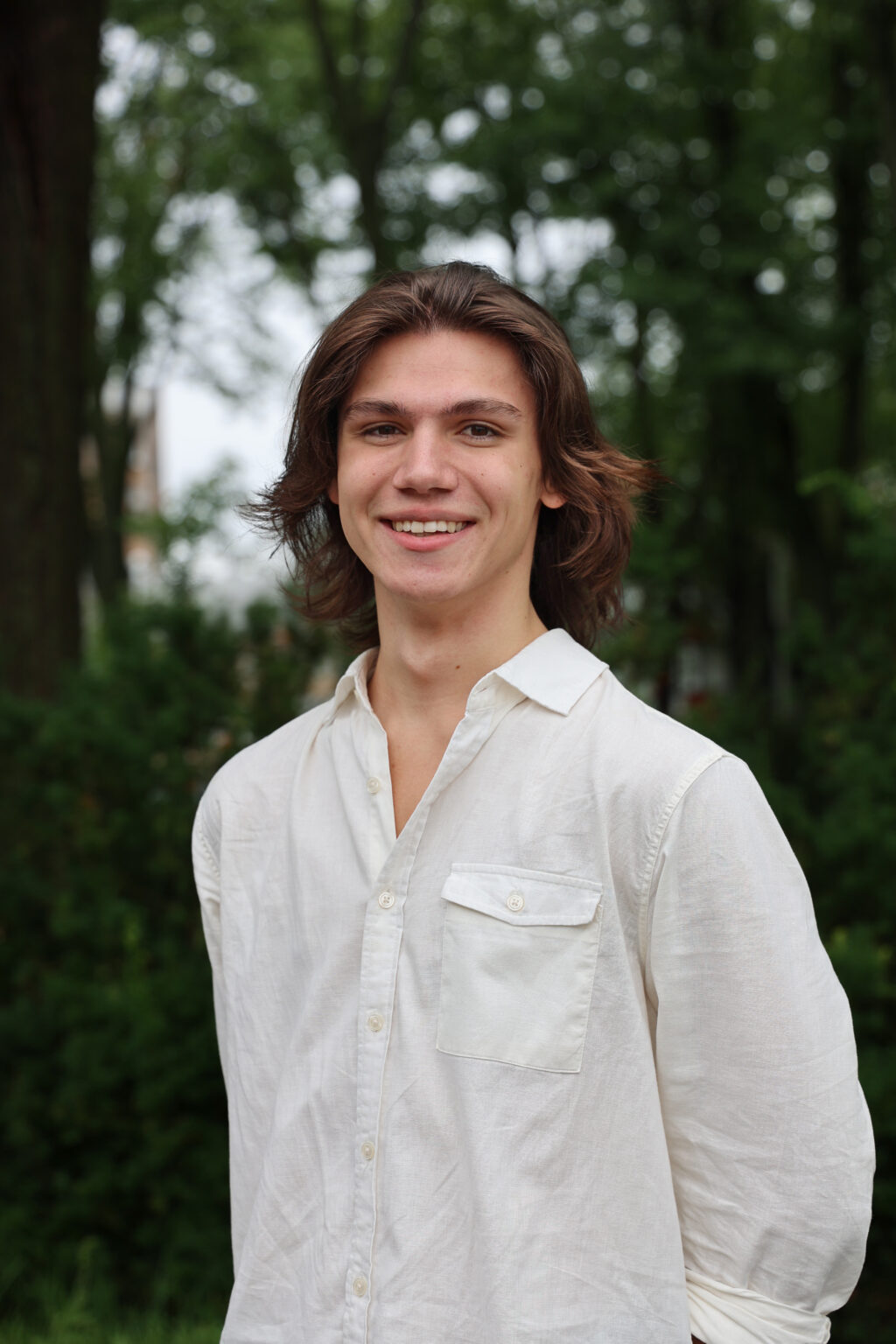
Where Science Meets Creativity
Connecting Disciplines, Expanding Perspectives
Make meaningful connections between your science and art courses. This integrated approach fosters critical thinking, creativity, and problem-solving by encouraging students to explore complex topics from diverse perspectives.
Gain Valuable Experience in a Lab Full of Cutting-Edge Equipment
With dedicated laboratories for biology, chemistry, and physics, students can put theory into practice through hands-on experiments.
Study in French, English, and Spanish
Develop the multilingual communication skills that will make you stand out in any field.
During your Double DEC, you will have the opportunity to learn Spanish in college-level courses I, II and III as well as refine your skills in French and English.
2
diplomas in 3 years
3
well-equipped labs at your disposal
3
languages of study
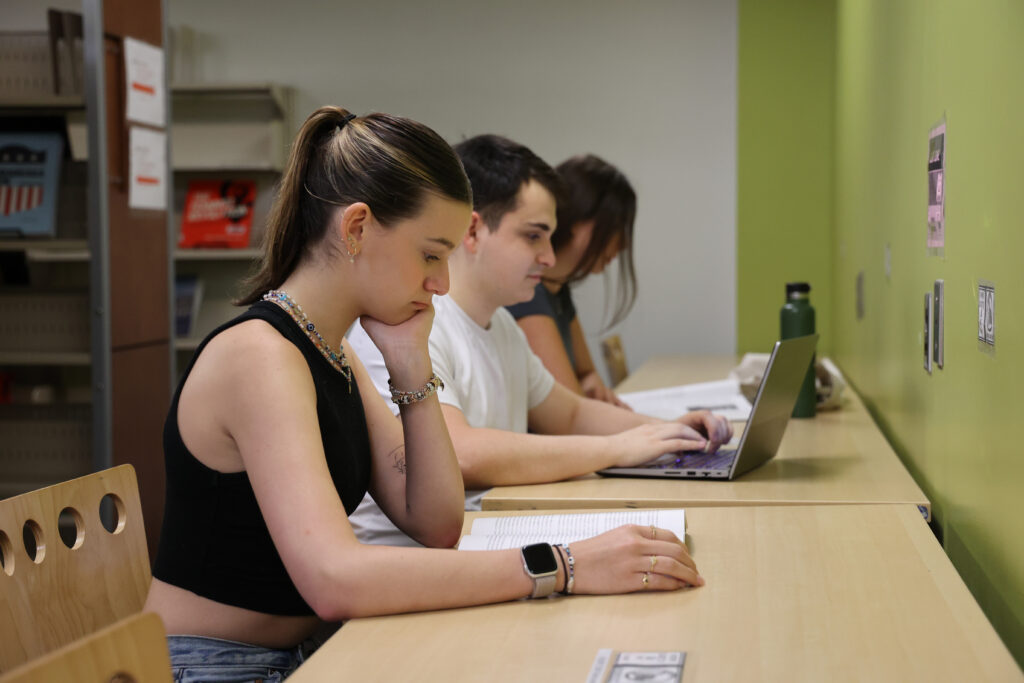
Take the Lead in Your Studies
While there are no formal profiles in the Double DEC program, you can personalize your upper-level course selections to align with your university and career goals. Within the Languages option, you’ll have the opportunity to study in English, French and Spanish. Your specific course sequence is determined by whether you hold a Certificate and your prior knowledge of Spanish.
If you are eligible to attend English school under the Charter of the French language and are in possession of a certificate granted by the Ministry of Education, you are considered a Certificate Holder. Your course sequence will then be determined by your results in the high school French course (1-2 or 3-4). For more information about Certificates, please consult the Ministry of Education’s website. If you are not eligible, you must follow the course sequence for Non Certificate Holders that prepares students for l’Épreuve uniforme de français (EUF – French ministerial language evaluation).
This sequence takes you through college-level courses I, II and III in Spanish.
This sequence takes you through college-level courses II, III and IV in Spanish.
Language Equivalency Procedure (Spanish)
Students with prior knowledge of Spanish may request a course equivalency for a fee of $25.
Steps:
- Submit the Request for Equivalency Form and $25 payment to admissionslc@crcmail.net. A placement test will be sent to you.
- Based on your results, you may be invited to complete an additional test during the Welcome Days.
- Once the College has your results, they will be transmitted to you, and you will be placed in the appropriate level. You will be given credit for the prior courses.
- If you have any questions, please contact the Academic Advisor.
Courses for Students Without Prior Spanish Knowledge
Your specific course sequence is determined by your Certificate status.
Course sequence legend :
(Theory – Laboratory – Personal Work)
- Theory (T): Hours in class per week
- Laboratory (L): Hours of laboratory or internship per week
- Personal Work (P): Estimated personal work hours outside of class
- Total contact hours per week: Hours in class (Theory + Laboratory) for the semester
603-101-MQ
2-2-4
Introduction to College English
109-102-MQ
0-2-1
Physical Activity & Effectiveness
203-SN1-RE
3-2-3
Mechanics
This is the first course that students must take in physics and, as such, it is a prerequisite to understanding other branches of physics. Students will learn how to describe the motion of objects and the fundamental laws and principles of physics that govern motions. Course content includes vectors, translational and rotational kinematics, Newton’s Laws, translational and rotational dynamics, energy, momentum and the conservation laws.
201-SN2-RE
3-2-3
Differential Calculus
This course is a study of change from a mathematical view. Topics covered will include the following: limits and continuity; the definition of the derivative of a function of one variable and the rules for differentiation; implicit differentiation; higher order derivatives; differentials and linear approximations; and l’Hospital’s rule. Applications involve curve sketching, maxima and minima, and interpretations of rates of change, and will include problems encountered in the social sciences, especially economics.
603-610-LW
2-2-4
Introduction to Creation
In this course, students will become familiar with the language used in the study of the arts, culture, and the creative process by exploring specific elements from various works of literature. They will learn to express their creativity by carrying out practical projects through which they will acquire a mastery of the tools and models used in the expression of one’s creativity.
603-610-LW
2-1-3
Spanish I
During and upon completion of this course students will be able to understand simple oral and written messages in Spanish and communicate orally and in writing in a number of basic everyday situations. They will be introduced to the culture and history of Spanish-speaking countries.
602-UF0-MQ
2-1-3
Oeuvres narratives et écriture
Total 26h / week
603-103-MQ
2-2-3
Literary Themes in Poetry
345-101-MQ
3-1-3
Knowledge
202-SN1-RE
3-2-3
Properties of Matter
This course forms the basis for all studies in chemistry. It includes the following topics: atomic and electronic structure, the periodic table, chemical nomenclature and equations, stoichiometry, ionic and covalent bonding, molecular geometry, intermolecular forces, the solid and liquid states and phase changes, and an introduction to some descriptive chemistry.
201-SN3-RE
2-2-2
Integral Calculus
This course centers upon antiderivatives and their uses: integrals of functions of one variable, the fundamental theorem of calculus and methods of integration. Applications involve areas, differential equations, probability distributions, as well as problems encountered in the social sciences such as consumer and producer surplus, Gini index, etc. Improper integrals, sequences, series and Taylor polynomials are also considered.
603-610-LW
2-1-3
Spanish II
During and upon completion of this course students will be able to understand more complex oral and written messages in Spanish compared to Spanish 1. They will also communicate orally and in writing in an additional number of basic everyday situations and demonstrate familiarity with fundamental aspects of the culture and history of Spanish-speaking countries.
109-101-MQ
1-1-1
Physical Activity and Health
602-UF1-MQ
2-1-3
Poésie, théâtre et écriture
Total 25h / week
603-102-MQ
2-2-3
Literary Genres
202-SN2-RE
2-2-2
Chemistry of Solutions
This course is a continuation of Properties of Matter and focuses on the properties of the dissolved state, including the characterisation of solutions, colligative properties, reaction kinetics, homogeneous equilibria, solubility equilibria, acids and bases, and buffer systems.
602-110-LW
2-2-3
Le Québec à travers son art
Par l’application de différentes approches analytiques et l’étude de genres et de modes artistiques variés, les étudiant.e.s s’intéresseront à l’histoire du Québec et s’interrogeront sur l’évolution de la société au Québec au gré des époques et des différents milieux de vie. Au fil de leurs analyses, les étudiant.e.s pourront affiner leur regard sur le passé artistique et les développements actuels.
603-710-LW
2-2-3
Modes of Expression
By the end of this course, students will become familiar with the language and techniques specific to various modes of artistic and literary expression. In so doing, students will develop a thorough grasp of the methods of analysis and documentation pertaining to multiple forms of artistic expression.
201-SN1-RE
2-1-2
Probability and Statistics
This course is an introduction to essential notions of probability and statistics. It covers basic probability theory (combinatorics, rules of probability, conditional probabilities, random variables, probability distributions) and inferential statistics (estimation and hypothesis testing on means, proportions, independence, correlation, etc.). A particular focus is given on the analysis of social science research data.
203-SN2-RE
2-2-2
Electricity and Magnetism
This is the second course that students must take in physics, and it will provide students with a fundamental knowledge of the laws of electromagnetism. Course content includes electric charge and Coulomb’s Law, electric field, electric potential, capacitance, electric current, circuits, moving charges and magnetism, the magnetic field, Ampere’s Law, Faraday’s Law, and inductance.
602-UF2-MQ
2-1-3
Comparaison d’oeuvres littéraires
Total 26h / week
603-BNR-LW
2-2-2
Long Fiction
345-102-MQ
3-0-3
World Views
101-SN1-RE
2-2-2
Cell Biology and Genetics
The purpose of this course is to provide an introduction to the biology of the cell and the foundations of genetics. We begin by characterizing cell structures and functions. From here, we examine the stages of the cell cycle, including cell division and cell death. We then look at some classic elements of cell metabolism, including membrane transport and cell respiration, before covering the main mechanisms leading to protein synthesis. Finally, we examine some of the principles governing heredity, including basic Mendelian genetics as well as other models of inheritance.
420-SNF-LW
1-2-3
Programmation en sciences
603-810-LW
2-2-3
Evolving Expressions
The objective of this course is to take students on a historical journey and trace the evolution of a specific mode of expression in time and the artistic currents that have punctuated its development. Students will then apply the knowledge acquired in the course to the production of a creative project.
602-120-LW
1-2-3
On sort: parcours culturels
Ce cours vise à offrir aux étudiant.e.s des occasions de découvertes artistiques dans un cadre analytique défini pour leur permettre de porter un jugement critique pertinent et personnel. Que ce soit par des visites au théâtre, par l’écoute de concerts, par la visite d’un musée ou par la participation à des événements multidisciplinaires, les étudiant.e.s seront invité.e.s à comprendre l’écosystème des différents milieux artistiques de la ville de Québec.
201-SN4-RE
2-2-2
Linear Algebra
This course is an introduction to linear algebra. Topics include matrices (matrix arithmetic and inverses, determinants, etc.), methods for solving systems of linear equations, vectors (geometric and arithmetic vectors, dot and cross products, projections) with applications to lines and planes in 3-D space, as well as linear programming and the simplex method. Various applications in social science will be considered.
Total 25h / week
345-BNR-LW
3-0-3
Ethics
109-103-MQ
1-1-1
Physical Activity & Autonomy
603-310-LW
2-2-3
Perspectives in English Literature
Students will learn to identify and apply different critical perspectives to works of literature and discover how such theories lead to contrasting views of the human condition.
101-SN2-RE
2-1-2
Ecology and Evolution
607-310-LW
2-1-3
Spanish III
During and upon completion of this course, students will learn the structures and vocabulary needed to understand and communicate orally and in writing with some circumlocutions on most subjects relevant to everyday life. They will also interact spontaneously and meaningfully in Spanish to talk and discuss on topics related to the history and culture of Spanish-Speaking countries.
603-210-LW
2-1-3
Canadian Arts and Literature
This course is an exploration of Canadian cultural expression through the study of Canadian literature and associated arts. Students will explore and examine the relationship between works of Canadian fiction, cultural institutions and the creative process.
Science/Math
2-2-2
Science/Math option
Total 22h / week
502-411-LW
2-2-4
Exploring Cultural Diversity
This course will enable students to compare aspects of contemporary culture between the local Canadian and Québec context and the context of countries associated with one of the foreign languages studied in the program (Spanish). Themes and issues will be approached in Spanish with the help of examples from the arts, short literary texts and coverage in the media.
203-SN3-RE
3-2-3
Waves and Modern Physics
This is the third course that students must take in physics, and it will provide students with a fundamental knowledge of the principles of wave motion as they pertain to light and sound. Course content includes oscillations, simple harmonic motion, mechanical waves, sound, the Doppler effect, light, electromagnetic theory, the concept of a photon, quantum physics, nuclear physics, radiation, radiation and nuclear energy as well as how some of these topics relate to the environment.
603-550-LW
2-2-4
Pop Fiction
In a variety of works and genres, students will explore the fascinating world of Pop Fiction, the themes and media used for its expression, and the meaning and purpose of Pop Fiction in the postmodern age.
602-130-LW
2-2-4
Projet créatif
Dans le cadre de ce cours, les étudiant.e.s seront initié.e.s à différentes approches créatives, en littérature, en poésie, en théâtre, etc., en vue de la création d’un projet personnel, de son élaboration à la production finale. Afin de bien s’inscrire dans leur milieu culturel, les étudiant.e.s devront s’appuyer sur leurs connaissances pour justifier les choix artistiques qu’ils et elles auront voulu mettre en œuvre.
Science/Math
2-2-2
Science/Math option
CA/IA
0-3-3
Science CA/IA
Total 24h / week
603-101-MQ
2-2-4
Introduction to College English
109-102-MQ
0-2-1
Physical Activity & Effectiveness
203-SN1-RE
3-2-3
Mechanics
This is the first course that students must take in physics and, as such, it is a prerequisite to understanding other branches of physics. Students will learn how to describe the motion of objects and the fundamental laws and principles of physics that govern motions. Course content includes vectors, translational and rotational kinematics, Newton’s Laws, translational and rotational dynamics, energy, momentum and the conservation laws.
201-SN2-RE
3-2-3
Differential Calculus
This course is a study of change from a mathematical view. Topics covered will include the following: limits and continuity; the definition of the derivative of a function of one variable and the rules for differentiation; implicit differentiation; higher order derivatives; differentials and linear approximations; and l’Hospital’s rule. Applications involve curve sketching, maxima and minima, and interpretations of rates of change, and will include problems encountered in the social sciences, especially economics.
603-610-LW
2-2-4
Introduction to Creation
In this course, students will become familiar with the language used in the study of the arts, culture, and the creative process by exploring specific elements from various works of literature. They will learn to express their creativity by carrying out practical projects through which they will acquire a mastery of the tools and models used in the expression of one’s creativity.
603-610-LW
2-1-3
Spanish I
During and upon completion of this course students will be able to understand simple oral and written messages in Spanish and communicate orally and in writing in a number of basic everyday situations. They will be introduced to the culture and history of Spanish-speaking countries.
602-10X-MQ
2-1-3
Français Bloc A
Total 26h / week
603-103-MQ
2-2-3
Literary Themes in Poetry
202-SN1-RE
3-2-3
Properties of Matter
This course forms the basis for all studies in chemistry. It includes the following topics: atomic and electronic structure, the periodic table, chemical nomenclature and equations, stoichiometry, ionic and covalent bonding, molecular geometry, intermolecular forces, the solid and liquid states and phase changes, and an introduction to some descriptive chemistry.
201-SN3-RE
2-2-2
Integral Calculus
This course centers upon antiderivatives and their uses: integrals of functions of one variable, the fundamental theorem of calculus and methods of integration. Applications involve areas, differential equations, probability distributions, as well as problems encountered in the social sciences such as consumer and producer surplus, Gini index, etc. Improper integrals, sequences, series and Taylor polynomials are also considered.
603-610-LW
2-1-3
Spanish II
During and upon completion of this course students will be able to understand more complex oral and written messages in Spanish compared to Spanish 1. They will also communicate orally and in writing in an additional number of basic everyday situations and demonstrate familiarity with fundamental aspects of the culture and history of Spanish-speaking countries.
109-101-MQ
1-1-1
Physical Activity and Health
201-SN1-RE
2-1-2
Probability and Statistics
This course is an introduction to essential notions of probability and statistics. It covers basic probability theory (combinatorics, rules of probability, conditional probabilities, random variables, probability distributions) and inferential statistics (estimation and hypothesis testing on means, proportions, independence, correlation, etc.). A particular focus is given on the analysis of social science research data.
602-BNY-MQ
2-1-3
Français Bloc B
Total 24h / week
603-102-MQ
2-2-3
Literary Genres
202-SN2-RE
2-2-2
Chemistry of Solutions
This course is a continuation of Properties of Matter and focuses on the properties of the dissolved state, including the characterisation of solutions, colligative properties, reaction kinetics, homogeneous equilibria, solubility equilibria, acids and bases, and buffer systems.
602-110-LW
2-2-3
Le Québec à travers son art
Par l’application de différentes approches analytiques et l’étude de genres et de modes artistiques variés, les étudiant.e.s s’intéresseront à l’histoire du Québec et s’interrogeront sur l’évolution de la société au Québec au gré des époques et des différents milieux de vie. Au fil de leurs analyses, les étudiant.e.s pourront affiner leur regard sur le passé artistique et les développements actuels.
603-710-LW
2-2-3
Modes of Expression
By the end of this course, students will become familiar with the language and techniques specific to various modes of artistic and literary expression. In so doing, students will develop a thorough grasp of the methods of analysis and documentation pertaining to multiple forms of artistic expression.
345-101-MQ
3-1-3
Knowledge
603-210-LW
2-1-3
Canadian Arts and Literature
This course is an exploration of Canadian cultural expression through the study of Canadian literature and associated arts. Students will explore and examine the relationship between works of Canadian fiction, cultural institutions and the creative process.
Total 23h / week
603-BNR-LW
2-2-2
Long Fiction
345-102-MQ
3-0-3
World Views
101-SN1-RE
2-2-2
Cell Biology and Genetics
The purpose of this course is to provide an introduction to the biology of the cell and the foundations of genetics. We begin by characterizing cell structures and functions. From here, we examine the stages of the cell cycle, including cell division and cell death. We then look at some classic elements of cell metabolism, including membrane transport and cell respiration, before covering the main mechanisms leading to protein synthesis. Finally, we examine some of the principles governing heredity, including basic Mendelian genetics as well as other models of inheritance.
420-SNE-LW
1-2-3
Introduction to Programming
603-810-LW
2-2-3
Evolving Expressions
The objective of this course is to take students on a historical journey and trace the evolution of a specific mode of expression in time and the artistic currents that have punctuated its development. Students will then apply the knowledge acquired in the course to the production of a creative project.
602-120-LW
1-2-3
On sort: parcours culturels
Ce cours vise à offrir aux étudiant.e.s des occasions de découvertes artistiques dans un cadre analytique défini pour leur permettre de porter un jugement critique pertinent et personnel. Que ce soit par des visites au théâtre, par l’écoute de concerts, par la visite d’un musée ou par la participation à des événements multidisciplinaires, les étudiant.e.s seront invité.e.s à comprendre l’écosystème des différents milieux artistiques de la ville de Québec.
203-SN2-RE
2-2-2
Electricity and Magnetism
This is the second course that students must take in physics, and it will provide students with a fundamental knowledge of the laws of electromagnetism. Course content includes electric charge and Coulomb’s Law, electric field, electric potential, capacitance, electric current, circuits, moving charges and magnetism, the magnetic field, Ampere’s Law, Faraday’s Law, and inductance.
Total 25h / week
345-BNR-LW
3-0-3
Ethics
109-103-MQ
1-1-1
Physical Activity & Autonomy
603-310-LW
2-2-3
Perspectives in English Literature
Students will learn to identify and apply different critical perspectives to works of literature and discover how such theories lead to contrasting views of the human condition.
101-SN2-RE
2-1-2
Ecology and Evolution
607-310-LW
2-1-3
Spanish III
During and upon completion of this course, students will learn the structures and vocabulary needed to understand and communicate orally and in writing with some circumlocutions on most subjects relevant to everyday life. They will also interact spontaneously and meaningfully in Spanish to talk and discuss on topics related to the history and culture of Spanish-Speaking countries.
201-SN4-RE
2-2-2
Linear Algebra
This course is an introduction to linear algebra. Topics include matrices (matrix arithmetic and inverses, determinants, etc.), methods for solving systems of linear equations, vectors (geometric and arithmetic vectors, dot and cross products, projections) with applications to lines and planes in 3-D space, as well as linear programming and the simplex method. Various applications in social science will be considered.
Science/Math
2-2-2
Science/Math option
Total 23h / week
502-411-LW
2-2-4
Exploring Cultural Diversity
This course will enable students to compare aspects of contemporary culture between the local Canadian and Québec context and the context of countries associated with one of the foreign languages studied in the program (Spanish). Themes and issues will be approached in Spanish with the help of examples from the arts, short literary texts and coverage in the media.
203-SN3-RE
3-2-3
Waves and Modern Physics
This is the third course that students must take in physics, and it will provide students with a fundamental knowledge of the principles of wave motion as they pertain to light and sound. Course content includes oscillations, simple harmonic motion, mechanical waves, sound, the Doppler effect, light, electromagnetic theory, the concept of a photon, quantum physics, nuclear physics, radiation, radiation and nuclear energy as well as how some of these topics relate to the environment.
603-550-LW
2-2-4
Pop Fiction
In a variety of works and genres, students will explore the fascinating world of Pop Fiction, the themes and media used for its expression, and the meaning and purpose of Pop Fiction in the postmodern age.
602-130-LW
2-2-4
Projet créatif
Dans le cadre de ce cours, les étudiant.e.s seront initié.e.s à différentes approches créatives, en littérature, en poésie, en théâtre, etc., en vue de la création d’un projet personnel, de son élaboration à la production finale. Afin de bien s’inscrire dans leur milieu culturel, les étudiant.e.s devront s’appuyer sur leurs connaissances pour justifier les choix artistiques qu’ils et elles auront voulu mettre en œuvre.
Science/Math
2-2-2
Science/Math option
CA/IA
0-3-3
Science CA/IA
Total 24h / week
603-101-MQ
2-2-4
Introduction to College English
109-102-MQ
0-2-1
Physical Activity & Effectiveness
203-SN1-RE
3-2-3
Mechanics
This is the first course that students must take in physics and, as such, it is a prerequisite to understanding other branches of physics. Students will learn how to describe the motion of objects and the fundamental laws and principles of physics that govern motions. Course content includes vectors, translational and rotational kinematics, Newton’s Laws, translational and rotational dynamics, energy, momentum and the conservation laws.
201-SN2-RE
3-2-3
Differential Calculus
This course is a study of change from a mathematical view. Topics covered will include the following: limits and continuity; the definition of the derivative of a function of one variable and the rules for differentiation; implicit differentiation; higher order derivatives; differentials and linear approximations; and l’Hospital’s rule. Applications involve curve sketching, maxima and minima, and interpretations of rates of change, and will include problems encountered in the social sciences, especially economics.
603-610-LW
2-2-4
Introduction to Creation
In this course, students will become familiar with the language used in the study of the arts, culture, and the creative process by exploring specific elements from various works of literature. They will learn to express their creativity by carrying out practical projects through which they will acquire a mastery of the tools and models used in the expression of one’s creativity.
603-610-LW
2-1-3
Spanish I
During and upon completion of this course students will be able to understand simple oral and written messages in Spanish and communicate orally and in writing in a number of basic everyday situations. They will be introduced to the culture and history of Spanish-speaking countries.
602-10X-MQ
2-1-3
Français Bloc A
Total 26h / week
603-103-MQ
2-2-3
Literary Themes in Poetry
202-SN1-RE
3-2-3
Properties of Matter
This course forms the basis for all studies in chemistry. It includes the following topics: atomic and electronic structure, the periodic table, chemical nomenclature and equations, stoichiometry, ionic and covalent bonding, molecular geometry, intermolecular forces, the solid and liquid states and phase changes, and an introduction to some descriptive chemistry.
201-SN3-RE
2-2-2
Integral Calculus
This course centers upon antiderivatives and their uses: integrals of functions of one variable, the fundamental theorem of calculus and methods of integration. Applications involve areas, differential equations, probability distributions, as well as problems encountered in the social sciences such as consumer and producer surplus, Gini index, etc. Improper integrals, sequences, series and Taylor polynomials are also considered.
603-610-LW
2-1-3
Spanish II
During and upon completion of this course students will be able to understand more complex oral and written messages in Spanish compared to Spanish 1. They will also communicate orally and in writing in an additional number of basic everyday situations and demonstrate familiarity with fundamental aspects of the culture and history of Spanish-speaking countries.
345-101-MQ
3-1-3
Knowledge
201-SN1-RE
2-1-2
Probability and Statistics
This course is an introduction to essential notions of probability and statistics. It covers basic probability theory (combinatorics, rules of probability, conditional probabilities, random variables, probability distributions) and inferential statistics (estimation and hypothesis testing on means, proportions, independence, correlation, etc.). A particular focus is given on the analysis of social science research data.
602-BNY-MQ
2-1-3
Français Bloc B
Total 26h / week
603-102-MQ
2-2-3
Literary Genres
202-SN2-RE
2-2-2
Chemistry of Solutions
This course is a continuation of Properties of Matter and focuses on the properties of the dissolved state, including the characterisation of solutions, colligative properties, reaction kinetics, homogeneous equilibria, solubility equilibria, acids and bases, and buffer systems.
602-110-LW
2-2-3
Le Québec à travers son art
Par l’application de différentes approches analytiques et l’étude de genres et de modes artistiques variés, les étudiant.e.s s’intéresseront à l’histoire du Québec et s’interrogeront sur l’évolution de la société au Québec au gré des époques et des différents milieux de vie. Au fil de leurs analyses, les étudiant.e.s pourront affiner leur regard sur le passé artistique et les développements actuels.
603-710-LW
2-2-3
Modes of Expression
By the end of this course, students will become familiar with the language and techniques specific to various modes of artistic and literary expression. In so doing, students will develop a thorough grasp of the methods of analysis and documentation pertaining to multiple forms of artistic expression.
203-SN2-RE
2-2-2
Electricity and Magnetism
This is the second course that students must take in physics, and it will provide students with a fundamental knowledge of the laws of electromagnetism. Course content includes electric charge and Coulomb’s Law, electric field, electric potential, capacitance, electric current, circuits, moving charges and magnetism, the magnetic field, Ampere’s Law, Faraday’s Law, and inductance.
603-210-LW
2-1-3
Canadian Arts and Literature
This course is an exploration of Canadian cultural expression through the study of Canadian literature and associated arts. Students will explore and examine the relationship between works of Canadian fiction, cultural institutions and the creative process.
Total 23h / week
603-BNR-LW
2-2-2
Long Fiction
345-112-MQ
3-0-3
Conceptions du monde
101-SN1-RE
2-2-2
Cell Biology and Genetics
The purpose of this course is to provide an introduction to the biology of the cell and the foundations of genetics. We begin by characterizing cell structures and functions. From here, we examine the stages of the cell cycle, including cell division and cell death. We then look at some classic elements of cell metabolism, including membrane transport and cell respiration, before covering the main mechanisms leading to protein synthesis. Finally, we examine some of the principles governing heredity, including basic Mendelian genetics as well as other models of inheritance.
420-SNF-LW
1-2-3
Programmation en sciences
603-810-LW
2-2-3
Evolving Expressions
The objective of this course is to take students on a historical journey and trace the evolution of a specific mode of expression in time and the artistic currents that have punctuated its development. Students will then apply the knowledge acquired in the course to the production of a creative project.
109-101-MQ
1-1-1
Physical Activity and Health
602-120-LW
1-2-3
On sort: parcours culturels
Ce cours vise à offrir aux étudiant.e.s des occasions de découvertes artistiques dans un cadre analytique défini pour leur permettre de porter un jugement critique pertinent et personnel. Que ce soit par des visites au théâtre, par l’écoute de concerts, par la visite d’un musée ou par la participation à des événements multidisciplinaires, les étudiant.e.s seront invité.e.s à comprendre l’écosystème des différents milieux artistiques de la ville de Québec.
Total 23h / week
345-BNR-LW
3-0-3
Ethics
109-103-MQ
1-1-1
Physical Activity & Autonomy
603-310-LW
2-2-3
Perspectives in English Literature
Students will learn to identify and apply different critical perspectives to works of literature and discover how such theories lead to contrasting views of the human condition.
101-SN2-RE
2-1-2
Ecology and Evolution
607-310-LW
2-1-3
Spanish III
During and upon completion of this course, students will learn the structures and vocabulary needed to understand and communicate orally and in writing with some circumlocutions on most subjects relevant to everyday life. They will also interact spontaneously and meaningfully in Spanish to talk and discuss on topics related to the history and culture of Spanish-Speaking countries.
201-SN4-RE
2-2-2
Linear Algebra
This course is an introduction to linear algebra. Topics include matrices (matrix arithmetic and inverses, determinants, etc.), methods for solving systems of linear equations, vectors (geometric and arithmetic vectors, dot and cross products, projections) with applications to lines and planes in 3-D space, as well as linear programming and the simplex method. Various applications in social science will be considered.
Science/Math
2-2-2
Science/Math option
Total 23h / week
502-411-LW
2-2-4
Exploring Cultural Diversity
This course will enable students to compare aspects of contemporary culture between the local Canadian and Québec context and the context of countries associated with one of the foreign languages studied in the program (Spanish). Themes and issues will be approached in Spanish with the help of examples from the arts, short literary texts and coverage in the media.
203-SN3-RE
3-2-3
Waves and Modern Physics
This is the third course that students must take in physics, and it will provide students with a fundamental knowledge of the principles of wave motion as they pertain to light and sound. Course content includes oscillations, simple harmonic motion, mechanical waves, sound, the Doppler effect, light, electromagnetic theory, the concept of a photon, quantum physics, nuclear physics, radiation, radiation and nuclear energy as well as how some of these topics relate to the environment.
603-550-LW
2-2-4
Pop Fiction
In a variety of works and genres, students will explore the fascinating world of Pop Fiction, the themes and media used for its expression, and the meaning and purpose of Pop Fiction in the postmodern age.
602-130-LW
2-2-4
Projet créatif
Dans le cadre de ce cours, les étudiant.e.s seront initié.e.s à différentes approches créatives, en littérature, en poésie, en théâtre, etc., en vue de la création d’un projet personnel, de son élaboration à la production finale. Afin de bien s’inscrire dans leur milieu culturel, les étudiant.e.s devront s’appuyer sur leurs connaissances pour justifier les choix artistiques qu’ils et elles auront voulu mettre en œuvre.
Science/Math
2-2-2
Science/Math option
CA/IA
0-3-3
Science CA/IA
Total 24h / week
Courses for Students With Prior Spanish Knowledge
Your specific course sequence is determined by your Certificate status.
603-101-MQ
2-2-4
Introduction to College English
203-SN1-RE
3-2-3
Mechanics
This is the first course that students must take in physics and, as such, it is a prerequisite to understanding other branches of physics. Students will learn how to describe the motion of objects and the fundamental laws and principles of physics that govern motions. Course content includes vectors, translational and rotational kinematics, Newton’s Laws, translational and rotational dynamics, energy, momentum and the conservation laws.
201-SN2-RE
3-2-3
Differential Calculus
This course is a study of change from a mathematical view. Topics covered will include the following: limits and continuity; the definition of the derivative of a function of one variable and the rules for differentiation; implicit differentiation; higher order derivatives; differentials and linear approximations; and l’Hospital’s rule. Applications involve curve sketching, maxima and minima, and interpretations of rates of change, and will include problems encountered in the social sciences, especially economics.
603-610-LW
2-2-4
Introduction to Creation
In this course, students will become familiar with the language used in the study of the arts, culture, and the creative process by exploring specific elements from various works of literature. They will learn to express their creativity by carrying out practical projects through which they will acquire a mastery of the tools and models used in the expression of one’s creativity.
602-110-LW
2-2-3
Le Québec à travers son art
Par l’application de différentes approches analytiques et l’étude de genres et de modes artistiques variés, les étudiant.e.s s’intéresseront à l’histoire du Québec et s’interrogeront sur l’évolution de la société au Québec au gré des époques et des différents milieux de vie. Au fil de leurs analyses, les étudiant.e.s pourront affiner leur regard sur le passé artistique et les développements actuels.
602-UF0-MQ
2-1-3
Oeuvres narratives et écriture
Total 25h / week
603-103-MQ
2-2-3
Literary Themes in Poetry
202-SN1-RE
3-2-3
Properties of Matter
This course forms the basis for all studies in chemistry. It includes the following topics: atomic and electronic structure, the periodic table, chemical nomenclature and equations, stoichiometry, ionic and covalent bonding, molecular geometry, intermolecular forces, the solid and liquid states and phase changes, and an introduction to some descriptive chemistry.
201-SN3-RE
2-2-2
Integral Calculus
This course centers upon antiderivatives and their uses: integrals of functions of one variable, the fundamental theorem of calculus and methods of integration. Applications involve areas, differential equations, probability distributions, as well as problems encountered in the social sciences such as consumer and producer surplus, Gini index, etc. Improper integrals, sequences, series and Taylor polynomials are also considered.
603-610-LW
2-1-3
Spanish II
During and upon completion of this course students will be able to understand more complex oral and written messages in Spanish compared to Spanish 1. They will also communicate orally and in writing in an additional number of basic everyday situations and demonstrate familiarity with fundamental aspects of the culture and history of Spanish-speaking countries.
602-120-LW
1-2-3
On sort: parcours culturels
Ce cours vise à offrir aux étudiant.e.s des occasions de découvertes artistiques dans un cadre analytique défini pour leur permettre de porter un jugement critique pertinent et personnel. Que ce soit par des visites au théâtre, par l’écoute de concerts, par la visite d’un musée ou par la participation à des événements multidisciplinaires, les étudiant.e.s seront invité.e.s à comprendre l’écosystème des différents milieux artistiques de la ville de Québec.
345-101-MQ
3-1-3
Knowledge
602-UF1-MQ
2-1-3
Poésie, théâtre et écriture
Total 26h / week
603-102-MQ
2-2-3
Literary Genres
202-SN2-RE
2-2-2
Chemistry of Solutions
This course is a continuation of Properties of Matter and focuses on the properties of the dissolved state, including the characterisation of solutions, colligative properties, reaction kinetics, homogeneous equilibria, solubility equilibria, acids and bases, and buffer systems.
603-710-LW
2-2-3
Modes of Expression
By the end of this course, students will become familiar with the language and techniques specific to various modes of artistic and literary expression. In so doing, students will develop a thorough grasp of the methods of analysis and documentation pertaining to multiple forms of artistic expression.
203-SN2-RE
2-2-2
Electricity and Magnetism
This is the second course that students must take in physics, and it will provide students with a fundamental knowledge of the laws of electromagnetism. Course content includes electric charge and Coulomb’s Law, electric field, electric potential, capacitance, electric current, circuits, moving charges and magnetism, the magnetic field, Ampere’s Law, Faraday’s Law, and inductance.
420-SNF-LW
1-2-3
Programmation en sciences
602-UF2-MQ
2-1-3
Comparaison d’oeuvres littéraires
Total 25h / week
603-BNR-LW
2-2-2
Long Fiction
603-810-LW
2-2-3
Evolving Expressions
The objective of this course is to take students on a historical journey and trace the evolution of a specific mode of expression in time and the artistic currents that have punctuated its development. Students will then apply the knowledge acquired in the course to the production of a creative project.
201-SN4-RE
2-2-2
Linear Algebra
This course is an introduction to linear algebra. Topics include matrices (matrix arithmetic and inverses, determinants, etc.), methods for solving systems of linear equations, vectors (geometric and arithmetic vectors, dot and cross products, projections) with applications to lines and planes in 3-D space, as well as linear programming and the simplex method. Various applications in social science will be considered.
101-SN1-RE
2-2-2
Cell Biology and Genetics
The purpose of this course is to provide an introduction to the biology of the cell and the foundations of genetics. We begin by characterizing cell structures and functions. From here, we examine the stages of the cell cycle, including cell division and cell death. We then look at some classic elements of cell metabolism, including membrane transport and cell respiration, before covering the main mechanisms leading to protein synthesis. Finally, we examine some of the principles governing heredity, including basic Mendelian genetics as well as other models of inheritance.
201-SN1-RE
2-1-2
Probability and Statistics
This course is an introduction to essential notions of probability and statistics. It covers basic probability theory (combinatorics, rules of probability, conditional probabilities, random variables, probability distributions) and inferential statistics (estimation and hypothesis testing on means, proportions, independence, correlation, etc.). A particular focus is given on the analysis of social science research data.
607-410-LW
2-1-3
Spanish IV
During and upon completion of this course students will be able to understand more complex oral and written messages in Spanish and communicate orally and in writing in an additional number of basic everyday situations compared to Spanish III. They will demonstrate familiarity with additional aspects of the culture and history of Spanish-speaking countries. They will interact spontaneously and meaningfully in Spanish.
109-101-MQ
1-1-1
Physical Activity and Health
Total 24h / week
109-102-MQ
0-2-1
Physical Activity & Effectiveness
345-102-MQ
3-0-3
World Views
603-310-LW
2-2-3
Perspectives in English Literature
Students will learn to identify and apply different critical perspectives to works of literature and discover how such theories lead to contrasting views of the human condition.
101-SN2-RE
2-1-2
Ecology and Evolution
203-SN3-RE
3-2-3
Waves and Modern Physics
This is the third course that students must take in physics, and it will provide students with a fundamental knowledge of the principles of wave motion as they pertain to light and sound. Course content includes oscillations, simple harmonic motion, mechanical waves, sound, the Doppler effect, light, electromagnetic theory, the concept of a photon, quantum physics, nuclear physics, radiation, radiation and nuclear energy as well as how some of these topics relate to the environment.
603-210-LW
2-1-3
Canadian Arts and Literature
This course is an exploration of Canadian cultural expression through the study of Canadian literature and associated arts. Students will explore and examine the relationship between works of Canadian fiction, cultural institutions and the creative process.
Science/Math
2-2-2
Science/Math option
Total 22h / week
345-BNR-LW
3-0-3
Ethics
109-103-MQ
1-1-1
Physical Activity & Autonomy
502-411-LW
2-2-4
Exploring Cultural Diversity
This course will enable students to compare aspects of contemporary culture between the local Canadian and Québec context and the context of countries associated with one of the foreign languages studied in the program (Spanish). Themes and issues will be approached in Spanish with the help of examples from the arts, short literary texts and coverage in the media.
603-550-LW
2-2-4
Pop Fiction
In a variety of works and genres, students will explore the fascinating world of Pop Fiction, the themes and media used for its expression, and the meaning and purpose of Pop Fiction in the postmodern age.
602-130-LW
2-2-4
Projet créatif
Dans le cadre de ce cours, les étudiant.e.s seront initié.e.s à différentes approches créatives, en littérature, en poésie, en théâtre, etc., en vue de la création d’un projet personnel, de son élaboration à la production finale. Afin de bien s’inscrire dans leur milieu culturel, les étudiant.e.s devront s’appuyer sur leurs connaissances pour justifier les choix artistiques qu’ils et elles auront voulu mettre en œuvre.
Science/Math
2-2-2
Science/Math option
CA/IA
0-3-3
Science CA/IA
Total 24h / week
603-101-MQ
2-2-4
Introduction to College English
203-SN1-RE
3-2-3
Mechanics
This is the first course that students must take in physics and, as such, it is a prerequisite to understanding other branches of physics. Students will learn how to describe the motion of objects and the fundamental laws and principles of physics that govern motions. Course content includes vectors, translational and rotational kinematics, Newton’s Laws, translational and rotational dynamics, energy, momentum and the conservation laws.
201-SN2-RE
3-2-3
Differential Calculus
This course is a study of change from a mathematical view. Topics covered will include the following: limits and continuity; the definition of the derivative of a function of one variable and the rules for differentiation; implicit differentiation; higher order derivatives; differentials and linear approximations; and l’Hospital’s rule. Applications involve curve sketching, maxima and minima, and interpretations of rates of change, and will include problems encountered in the social sciences, especially economics.
603-610-LW
2-2-4
Introduction to Creation
In this course, students will become familiar with the language used in the study of the arts, culture, and the creative process by exploring specific elements from various works of literature. They will learn to express their creativity by carrying out practical projects through which they will acquire a mastery of the tools and models used in the expression of one’s creativity.
602-110-LW
2-2-3
Le Québec à travers son art
Par l’application de différentes approches analytiques et l’étude de genres et de modes artistiques variés, les étudiant.e.s s’intéresseront à l’histoire du Québec et s’interrogeront sur l’évolution de la société au Québec au gré des époques et des différents milieux de vie. Au fil de leurs analyses, les étudiant.e.s pourront affiner leur regard sur le passé artistique et les développements actuels.
602-10X-MQ
2-1-3
Français Bloc A
Total 25h / week
603-103-MQ
2-2-3
Literary Themes in Poetry
202-SN1-RE
3-2-3
Properties of Matter
This course forms the basis for all studies in chemistry. It includes the following topics: atomic and electronic structure, the periodic table, chemical nomenclature and equations, stoichiometry, ionic and covalent bonding, molecular geometry, intermolecular forces, the solid and liquid states and phase changes, and an introduction to some descriptive chemistry.
201-SN3-RE
2-2-2
Integral Calculus
This course centers upon antiderivatives and their uses: integrals of functions of one variable, the fundamental theorem of calculus and methods of integration. Applications involve areas, differential equations, probability distributions, as well as problems encountered in the social sciences such as consumer and producer surplus, Gini index, etc. Improper integrals, sequences, series and Taylor polynomials are also considered.
603-610-LW
2-1-3
Spanish II
During and upon completion of this course students will be able to understand more complex oral and written messages in Spanish compared to Spanish 1. They will also communicate orally and in writing in an additional number of basic everyday situations and demonstrate familiarity with fundamental aspects of the culture and history of Spanish-speaking countries.
602-120-LW
1-2-3
On sort: parcours culturels
Ce cours vise à offrir aux étudiant.e.s des occasions de découvertes artistiques dans un cadre analytique défini pour leur permettre de porter un jugement critique pertinent et personnel. Que ce soit par des visites au théâtre, par l’écoute de concerts, par la visite d’un musée ou par la participation à des événements multidisciplinaires, les étudiant.e.s seront invité.e.s à comprendre l’écosystème des différents milieux artistiques de la ville de Québec.
109-101-MQ
1-1-1
Physical Activity and Health
602-BNY-MQ
2-1-3
Français Bloc B
Total 24h / week
603-102-MQ
2-2-3
Literary Genres
202-SN2-RE
2-2-2
Chemistry of Solutions
This course is a continuation of Properties of Matter and focuses on the properties of the dissolved state, including the characterisation of solutions, colligative properties, reaction kinetics, homogeneous equilibria, solubility equilibria, acids and bases, and buffer systems.
603-710-LW
2-2-3
Modes of Expression
By the end of this course, students will become familiar with the language and techniques specific to various modes of artistic and literary expression. In so doing, students will develop a thorough grasp of the methods of analysis and documentation pertaining to multiple forms of artistic expression.
203-SN2-RE
2-2-2
Electricity and Magnetism
This is the second course that students must take in physics, and it will provide students with a fundamental knowledge of the laws of electromagnetism. Course content includes electric charge and Coulomb’s Law, electric field, electric potential, capacitance, electric current, circuits, moving charges and magnetism, the magnetic field, Ampere’s Law, Faraday’s Law, and inductance.
420-SNE-LW
1-2-3
Introduction to Programming
345-101-MQ
3-1-3
Knowledge
Total 26h / week
603-BNR-LW
2-2-2
Long Fiction
603-810-LW
2-2-3
Evolving Expressions
The objective of this course is to take students on a historical journey and trace the evolution of a specific mode of expression in time and the artistic currents that have punctuated its development. Students will then apply the knowledge acquired in the course to the production of a creative project.
201-SN4-RE
2-2-2
Linear Algebra
This course is an introduction to linear algebra. Topics include matrices (matrix arithmetic and inverses, determinants, etc.), methods for solving systems of linear equations, vectors (geometric and arithmetic vectors, dot and cross products, projections) with applications to lines and planes in 3-D space, as well as linear programming and the simplex method. Various applications in social science will be considered.
101-SN1-RE
2-2-2
Cell Biology and Genetics
The purpose of this course is to provide an introduction to the biology of the cell and the foundations of genetics. We begin by characterizing cell structures and functions. From here, we examine the stages of the cell cycle, including cell division and cell death. We then look at some classic elements of cell metabolism, including membrane transport and cell respiration, before covering the main mechanisms leading to protein synthesis. Finally, we examine some of the principles governing heredity, including basic Mendelian genetics as well as other models of inheritance.
201-SN1-RE
2-1-2
Probability and Statistics
This course is an introduction to essential notions of probability and statistics. It covers basic probability theory (combinatorics, rules of probability, conditional probabilities, random variables, probability distributions) and inferential statistics (estimation and hypothesis testing on means, proportions, independence, correlation, etc.). A particular focus is given on the analysis of social science research data.
607-410-LW
2-1-3
Spanish IV
During and upon completion of this course students will be able to understand more complex oral and written messages in Spanish and communicate orally and in writing in an additional number of basic everyday situations compared to Spanish III. They will demonstrate familiarity with additional aspects of the culture and history of Spanish-speaking countries. They will interact spontaneously and meaningfully in Spanish.
Total 22h / week
109-102-MQ
0-2-1
Physical Activity & Effectiveness
345-102-MQ
3-0-3
World Views
603-310-LW
2-2-3
Perspectives in English Literature
Students will learn to identify and apply different critical perspectives to works of literature and discover how such theories lead to contrasting views of the human condition.
101-SN2-RE
2-1-2
Ecology and Evolution
203-SN3-RE
3-2-3
Waves and Modern Physics
This is the third course that students must take in physics, and it will provide students with a fundamental knowledge of the principles of wave motion as they pertain to light and sound. Course content includes oscillations, simple harmonic motion, mechanical waves, sound, the Doppler effect, light, electromagnetic theory, the concept of a photon, quantum physics, nuclear physics, radiation, radiation and nuclear energy as well as how some of these topics relate to the environment.
603-210-LW
2-1-3
Canadian Arts and Literature
This course is an exploration of Canadian cultural expression through the study of Canadian literature and associated arts. Students will explore and examine the relationship between works of Canadian fiction, cultural institutions and the creative process.
Science/Math
2-2-2
Science/Math option
Total 24h / week
345-BNR-LW
3-0-3
Ethics
109-103-MQ
1-1-1
Physical Activity & Autonomy
502-411-LW
2-2-4
Exploring Cultural Diversity
This course will enable students to compare aspects of contemporary culture between the local Canadian and Québec context and the context of countries associated with one of the foreign languages studied in the program (Spanish). Themes and issues will be approached in Spanish with the help of examples from the arts, short literary texts and coverage in the media.
603-550-LW
2-2-4
Pop Fiction
In a variety of works and genres, students will explore the fascinating world of Pop Fiction, the themes and media used for its expression, and the meaning and purpose of Pop Fiction in the postmodern age.
602-130-LW
2-2-4
Projet créatif
Dans le cadre de ce cours, les étudiant.e.s seront initié.e.s à différentes approches créatives, en littérature, en poésie, en théâtre, etc., en vue de la création d’un projet personnel, de son élaboration à la production finale. Afin de bien s’inscrire dans leur milieu culturel, les étudiant.e.s devront s’appuyer sur leurs connaissances pour justifier les choix artistiques qu’ils et elles auront voulu mettre en œuvre.
Science/Math
2-2-2
Science/Math option
CA/IA
0-3-3
Science CA/IA
Total 24h / week
603-101-MQ
2-2-4
Introduction to College English
203-SN1-RE
3-2-3
Mechanics
This is the first course that students must take in physics and, as such, it is a prerequisite to understanding other branches of physics. Students will learn how to describe the motion of objects and the fundamental laws and principles of physics that govern motions. Course content includes vectors, translational and rotational kinematics, Newton’s Laws, translational and rotational dynamics, energy, momentum and the conservation laws.
201-SN2-RE
3-2-3
Differential Calculus
This course is a study of change from a mathematical view. Topics covered will include the following: limits and continuity; the definition of the derivative of a function of one variable and the rules for differentiation; implicit differentiation; higher order derivatives; differentials and linear approximations; and l’Hospital’s rule. Applications involve curve sketching, maxima and minima, and interpretations of rates of change, and will include problems encountered in the social sciences, especially economics.
603-610-LW
2-2-4
Introduction to Creation
In this course, students will become familiar with the language used in the study of the arts, culture, and the creative process by exploring specific elements from various works of literature. They will learn to express their creativity by carrying out practical projects through which they will acquire a mastery of the tools and models used in the expression of one’s creativity.
602-110-LW
2-2-3
Le Québec à travers son art
Par l’application de différentes approches analytiques et l’étude de genres et de modes artistiques variés, les étudiant.e.s s’intéresseront à l’histoire du Québec et s’interrogeront sur l’évolution de la société au Québec au gré des époques et des différents milieux de vie. Au fil de leurs analyses, les étudiant.e.s pourront affiner leur regard sur le passé artistique et les développements actuels.
602-10X-MQ
2-1-3
Français Bloc A
Total 25h / week
603-103-MQ
2-2-3
Literary Themes in Poetry
202-SN1-RE
3-2-3
Properties of Matter
This course forms the basis for all studies in chemistry. It includes the following topics: atomic and electronic structure, the periodic table, chemical nomenclature and equations, stoichiometry, ionic and covalent bonding, molecular geometry, intermolecular forces, the solid and liquid states and phase changes, and an introduction to some descriptive chemistry.
201-SN3-RE
2-2-2
Integral Calculus
This course centers upon antiderivatives and their uses: integrals of functions of one variable, the fundamental theorem of calculus and methods of integration. Applications involve areas, differential equations, probability distributions, as well as problems encountered in the social sciences such as consumer and producer surplus, Gini index, etc. Improper integrals, sequences, series and Taylor polynomials are also considered.
603-610-LW
2-1-3
Spanish II
During and upon completion of this course students will be able to understand more complex oral and written messages in Spanish compared to Spanish 1. They will also communicate orally and in writing in an additional number of basic everyday situations and demonstrate familiarity with fundamental aspects of the culture and history of Spanish-speaking countries.
602-120-LW
1-2-3
On sort: parcours culturels
Ce cours vise à offrir aux étudiant.e.s des occasions de découvertes artistiques dans un cadre analytique défini pour leur permettre de porter un jugement critique pertinent et personnel. Que ce soit par des visites au théâtre, par l’écoute de concerts, par la visite d’un musée ou par la participation à des événements multidisciplinaires, les étudiant.e.s seront invité.e.s à comprendre l’écosystème des différents milieux artistiques de la ville de Québec.
109-101-MQ
1-1-1
Physical Activity and Health
602-BNY-MQ
2-1-3
Français Bloc B
Total 24h / week
603-102-MQ
2-2-3
Literary Genres
202-SN2-RE
2-2-2
Chemistry of Solutions
This course is a continuation of Properties of Matter and focuses on the properties of the dissolved state, including the characterisation of solutions, colligative properties, reaction kinetics, homogeneous equilibria, solubility equilibria, acids and bases, and buffer systems.
603-710-LW
2-2-3
Modes of Expression
By the end of this course, students will become familiar with the language and techniques specific to various modes of artistic and literary expression. In so doing, students will develop a thorough grasp of the methods of analysis and documentation pertaining to multiple forms of artistic expression.
203-SN2-RE
2-2-2
Electricity and Magnetism
This is the second course that students must take in physics, and it will provide students with a fundamental knowledge of the laws of electromagnetism. Course content includes electric charge and Coulomb’s Law, electric field, electric potential, capacitance, electric current, circuits, moving charges and magnetism, the magnetic field, Ampere’s Law, Faraday’s Law, and inductance.
420-SNF-LW
1-2-3
Programmation en sciences
345-101-MQ
3-1-3
Knowledge
Total 22h / week
603-BNR-LW
2-2-2
Long Fiction
603-810-LW
2-2-3
Evolving Expressions
The objective of this course is to take students on a historical journey and trace the evolution of a specific mode of expression in time and the artistic currents that have punctuated its development. Students will then apply the knowledge acquired in the course to the production of a creative project.
201-SN4-RE
2-2-2
Linear Algebra
This course is an introduction to linear algebra. Topics include matrices (matrix arithmetic and inverses, determinants, etc.), methods for solving systems of linear equations, vectors (geometric and arithmetic vectors, dot and cross products, projections) with applications to lines and planes in 3-D space, as well as linear programming and the simplex method. Various applications in social science will be considered.
101-SN1-RE
2-2-2
Cell Biology and Genetics
The purpose of this course is to provide an introduction to the biology of the cell and the foundations of genetics. We begin by characterizing cell structures and functions. From here, we examine the stages of the cell cycle, including cell division and cell death. We then look at some classic elements of cell metabolism, including membrane transport and cell respiration, before covering the main mechanisms leading to protein synthesis. Finally, we examine some of the principles governing heredity, including basic Mendelian genetics as well as other models of inheritance.
201-SN1-RE
2-1-2
Probability and Statistics
This course is an introduction to essential notions of probability and statistics. It covers basic probability theory (combinatorics, rules of probability, conditional probabilities, random variables, probability distributions) and inferential statistics (estimation and hypothesis testing on means, proportions, independence, correlation, etc.). A particular focus is given on the analysis of social science research data.
607-410-LW
2-1-3
Spanish IV
During and upon completion of this course students will be able to understand more complex oral and written messages in Spanish and communicate orally and in writing in an additional number of basic everyday situations compared to Spanish III. They will demonstrate familiarity with additional aspects of the culture and history of Spanish-speaking countries. They will interact spontaneously and meaningfully in Spanish.
Total 22h / week
109-102-MQ
0-2-1
Physical Activity & Effectiveness
345-112-MQ
3-0-3
Conceptions du monde
603-310-LW
2-2-3
Perspectives in English Literature
Students will learn to identify and apply different critical perspectives to works of literature and discover how such theories lead to contrasting views of the human condition.
101-SN2-RE
2-1-2
Ecology and Evolution
203-SN3-RE
3-2-3
Waves and Modern Physics
This is the third course that students must take in physics, and it will provide students with a fundamental knowledge of the principles of wave motion as they pertain to light and sound. Course content includes oscillations, simple harmonic motion, mechanical waves, sound, the Doppler effect, light, electromagnetic theory, the concept of a photon, quantum physics, nuclear physics, radiation, radiation and nuclear energy as well as how some of these topics relate to the environment.
603-210-LW
2-1-3
Canadian Arts and Literature
This course is an exploration of Canadian cultural expression through the study of Canadian literature and associated arts. Students will explore and examine the relationship between works of Canadian fiction, cultural institutions and the creative process.
Science/Math
2-2-2
Science/Math option
Total 24h / week
345-BNR-LW
3-0-3
Ethics
109-103-MQ
1-1-1
Physical Activity & Autonomy
502-411-LW
2-2-4
Exploring Cultural Diversity
This course will enable students to compare aspects of contemporary culture between the local Canadian and Québec context and the context of countries associated with one of the foreign languages studied in the program (Spanish). Themes and issues will be approached in Spanish with the help of examples from the arts, short literary texts and coverage in the media.
603-550-LW
2-2-4
Pop Fiction
In a variety of works and genres, students will explore the fascinating world of Pop Fiction, the themes and media used for its expression, and the meaning and purpose of Pop Fiction in the postmodern age.
602-130-LW
2-2-4
Projet créatif
Dans le cadre de ce cours, les étudiant.e.s seront initié.e.s à différentes approches créatives, en littérature, en poésie, en théâtre, etc., en vue de la création d’un projet personnel, de son élaboration à la production finale. Afin de bien s’inscrire dans leur milieu culturel, les étudiant.e.s devront s’appuyer sur leurs connaissances pour justifier les choix artistiques qu’ils et elles auront voulu mettre en œuvre.
Science/Math
2-2-2
Science/Math option
CA/IA
0-3-3
Science CA/IA
Total 24h / week
Your Path to Graduation
All college programs in Québec have a graduate profile that outlines the competencies students are expected to develop to graduate from the program. To assess whether these expectations are met, students complete a comprehensive assessment (CA). In some programs, this assessment is integrated into a course featuring an integrative activity (IA) that builds on knowledge gained in previous courses.
For this Double DEC, you will complete the CA and IA requirements for both the Science and ALC programs during your sixth semester.
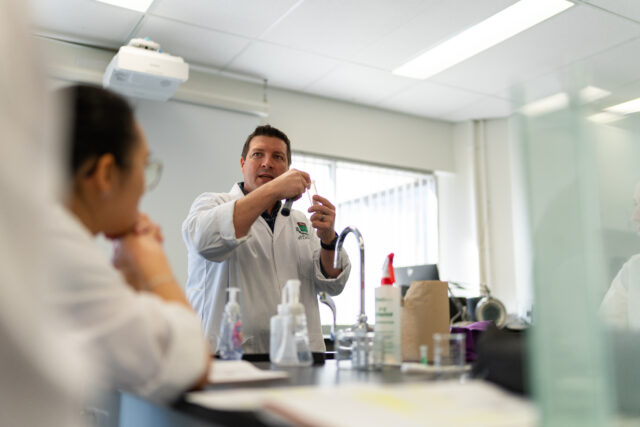
Science Graduate Profile
St. Lawrence Science Program graduates must be able to:
- Apply the scientific method
- Take a systematic approach to problem solving
- Use the appropriate information technologies
- Reason logically
- Communicate effectively
- Learn in an autonomous manner
- Work as members of a team
- Make connections between science, technology and social progress
- Identify their system of values
- Become familiar with the context in which scientific concepts are discovered and developed
- Develop attitudes appropriate for scientific work
- Apply what they have learned to new situations.
These goals are not assigned to specific disciplines. All the courses in the program contribute to the development and evaluation of one or more these skills.
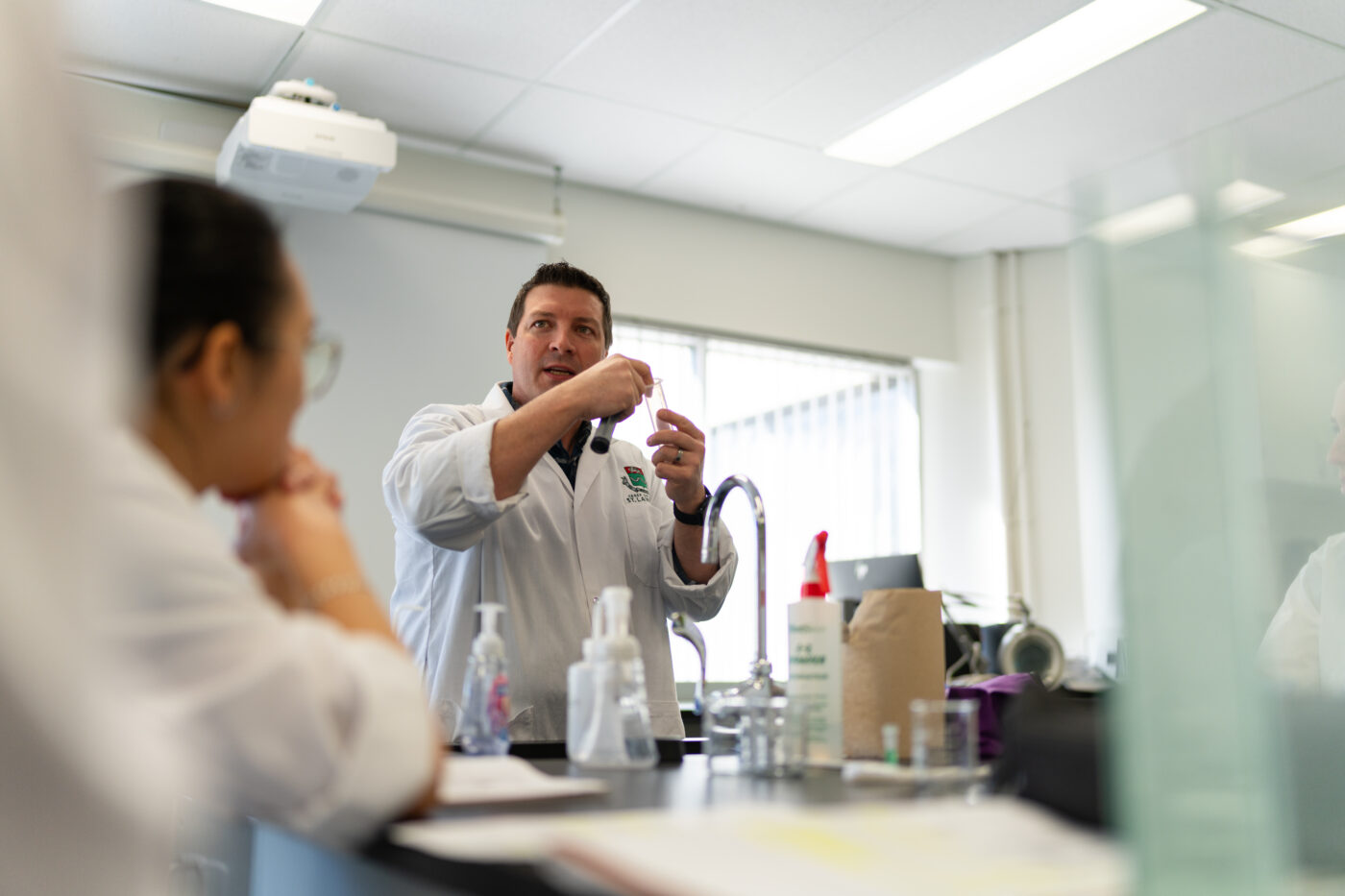

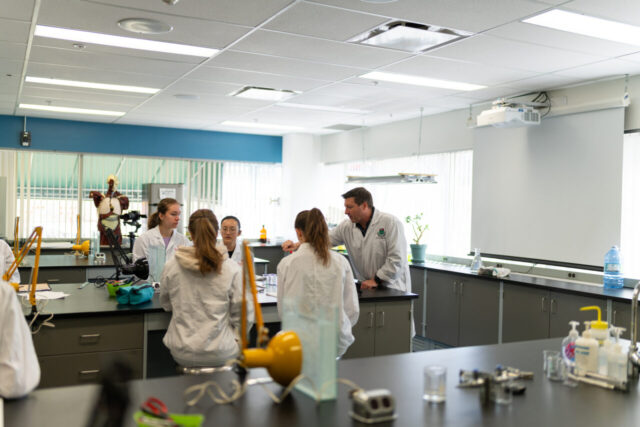
ALC Graduate Profile
Graduates of the St. Lawrence Arts, Literature and Communication Program shall be knowledgeable about the arts, grounded in literature and equipped to communicate in four languages. Graduates shall be able to:
- Approach questions of literary and aesthetic culture with the help of an understanding of Western classics and of English Canadian and Québec cultural contributions;
- Demonstrate intellectual curiosity and rigor in planning and conducting research activities, such as identifying appropriate sources and techniques, reading critically and presenting the results of critical reflection in oral and written form;
- Give expression to the creative process;
- Function with native-level proficiency in English, a high level of proficiency in French and a degree of independence in Spanish and German, supported by an understanding of grammatical structure and phonetics;
- Use appropriate information technology;
- Assess decisions with consideration for one’s own health and well being and for the effect on others and the environment.
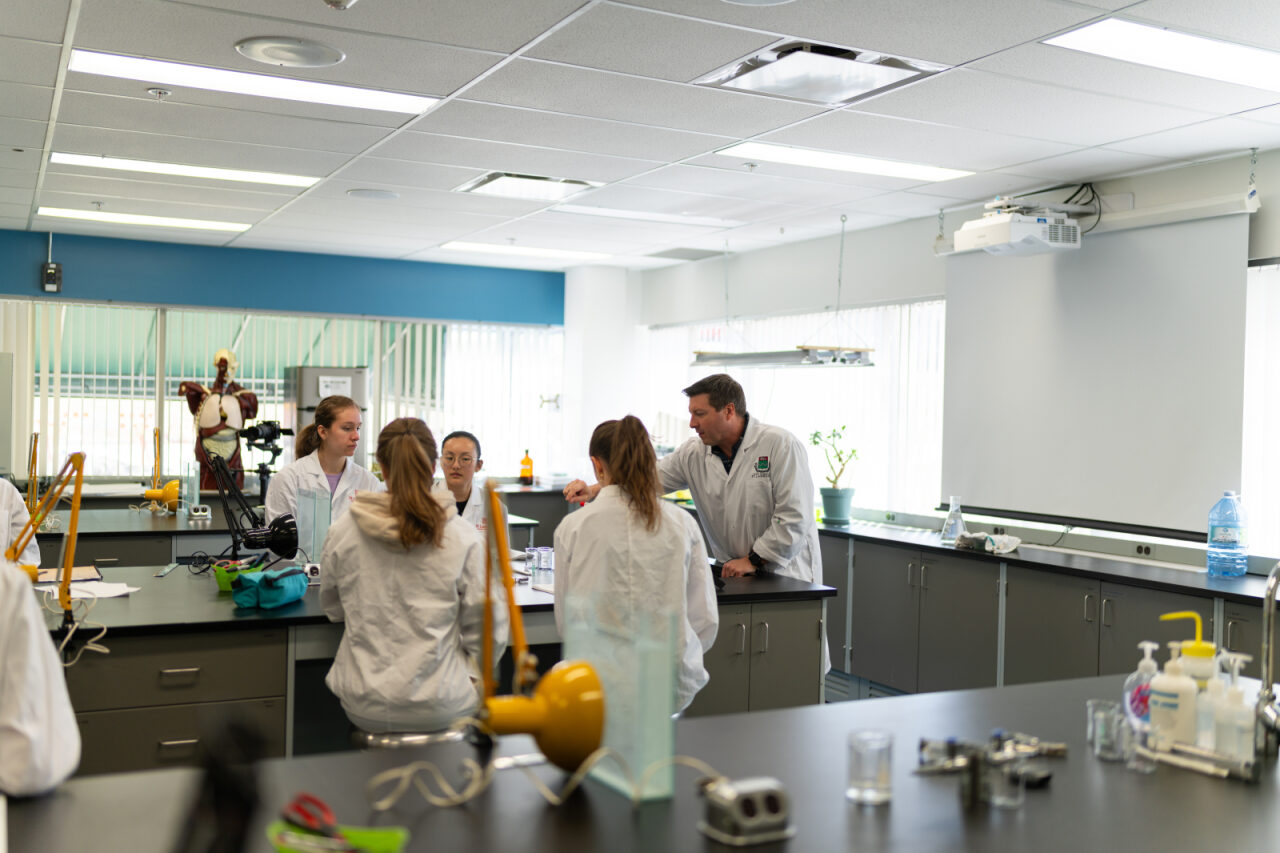

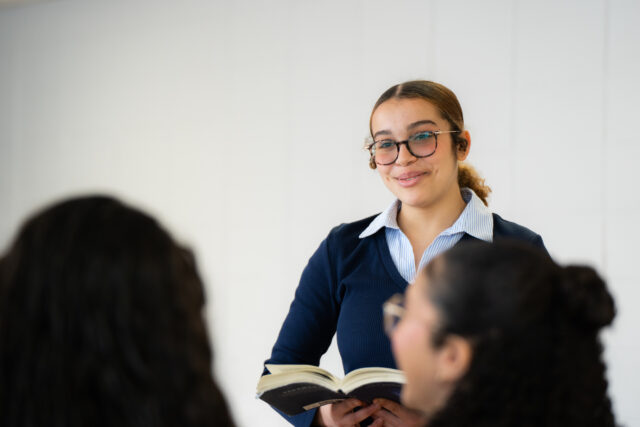
Science Comprehensive Assessment
What will be assessed?
The comprehensive assessment will be completed in the CA/IA option course that you take in your last semester of study. See the CA/IA course descriptions in either of the profiles of the Science Program.
The comprehensive assessment is based on a CA portfolio you produce during the CA/IA course. The portfolio must demonstrate that you have attained the 12 program goals of the graduate profile. It may contain work (tests, assignments, papers and such) completed during any of the courses that you have taken to fulfill the requirements of the Science Program and documents produced for the exercise on ethical issues, as well as the written report for the integrative activity. Alternatively, the portfolio may be made up of a self-reflective essay that evaluates how you have attained the goals and objectives of the Science Program, citing specific examples of what was done to achieve these goals.
The table below shows how the elements of the graduate profile are tied to the CA/IA course objectives or competencies defined by the government.
| Graduate Profile | Integration Objective (00UU)
To apply acquired knowledge to the study of one or more subjects in the sciences |
Science Option Objective (00UV)
To apply the scientific approach in a given scientific field |
| 1. Apply the scientific method
2. Take a systematic approach to problem solving 3.Apply what they have learned to new situations |
To apply the experimental method
To solve problems To recognize the contribution of more than one scientific discipline to certain situations |
To apply techniques of experimentation or validation specific to science
To solve problems using a method proper to science To represent various situations, drawing upon relevant concepts, laws and principles of science |
| 4. Use the appropriate information technologies | To use data-processing technologies | |
| 5. Reason logically | To reason logically | |
| 6. Communicate effectively | To communicate effectively | |
| 7. Learn in an autonomous manner
8.Become familiar with the context in which scientific concepts are discovered and developed |
To show evidence of independent learning in their choice of documentation or laboratory instruments | |
| 9. Work as members of a team | To work as members of a team | |
| 10. Make connections between science, technology and social progress | To make connections between science, technology and social progress | |
| 11. Identify their system of values | ||
| 12.Develop attitudes appropriate for scientific work |
How will it be assessed?
The CA portfolio will be prepared individually by you and handed in for evaluation. The teacher of the CA/IA course will ascertain with a pass/fail grade the attainment of the program skills using the criteria listed in the graduate profile.
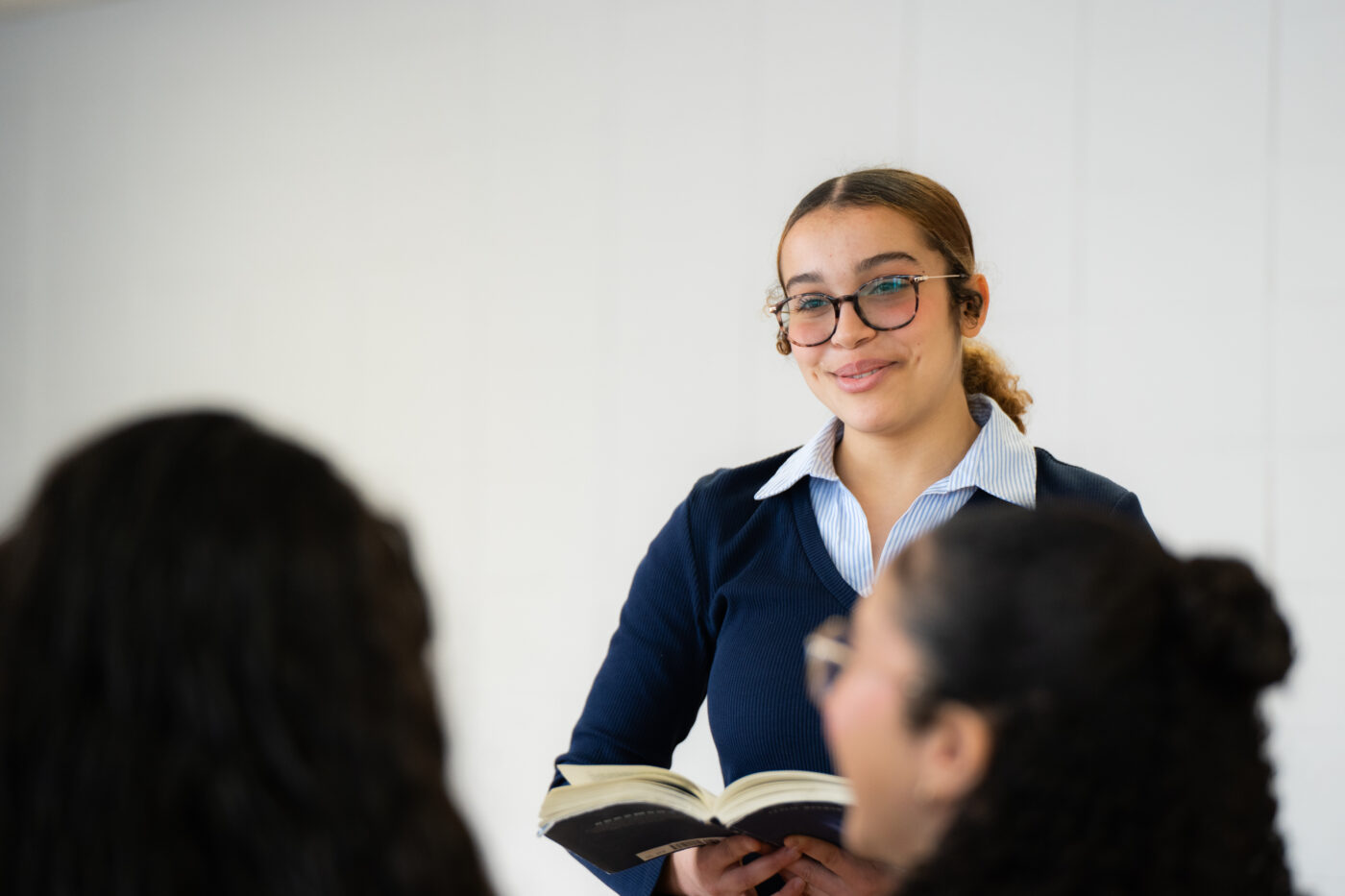

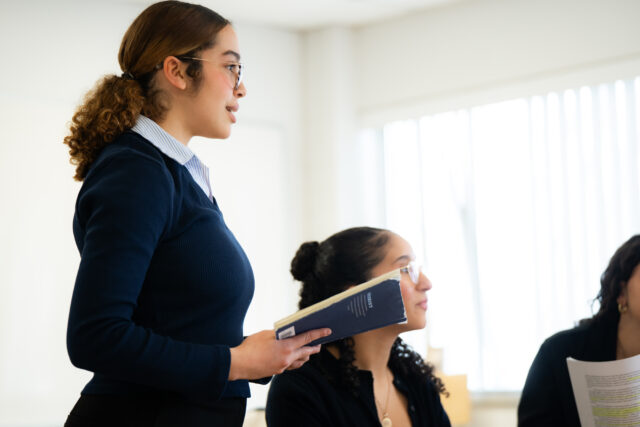
ALC Comprehensive Assessment
A Comprehensive Assessment (C.A.) demonstrating overall attainment of program competencies and the General Education Graduate Profile is required by the College Education Regulations under the General and Vocational Colleges Act and by the College’s Institutional Policy on the Evaluation of Student Achievement (IPESA).
The Comprehensive Assessment for the ALC Program is linked to three courses that involve analytical and creative work in the various languages of the program: Pop Fiction, Projet créatif, and Exploring Cultural Diversity. The Comprehensive Assessment consists of specific oral-based assessments and evaluations along with an essay and a reflection piece in these courses.
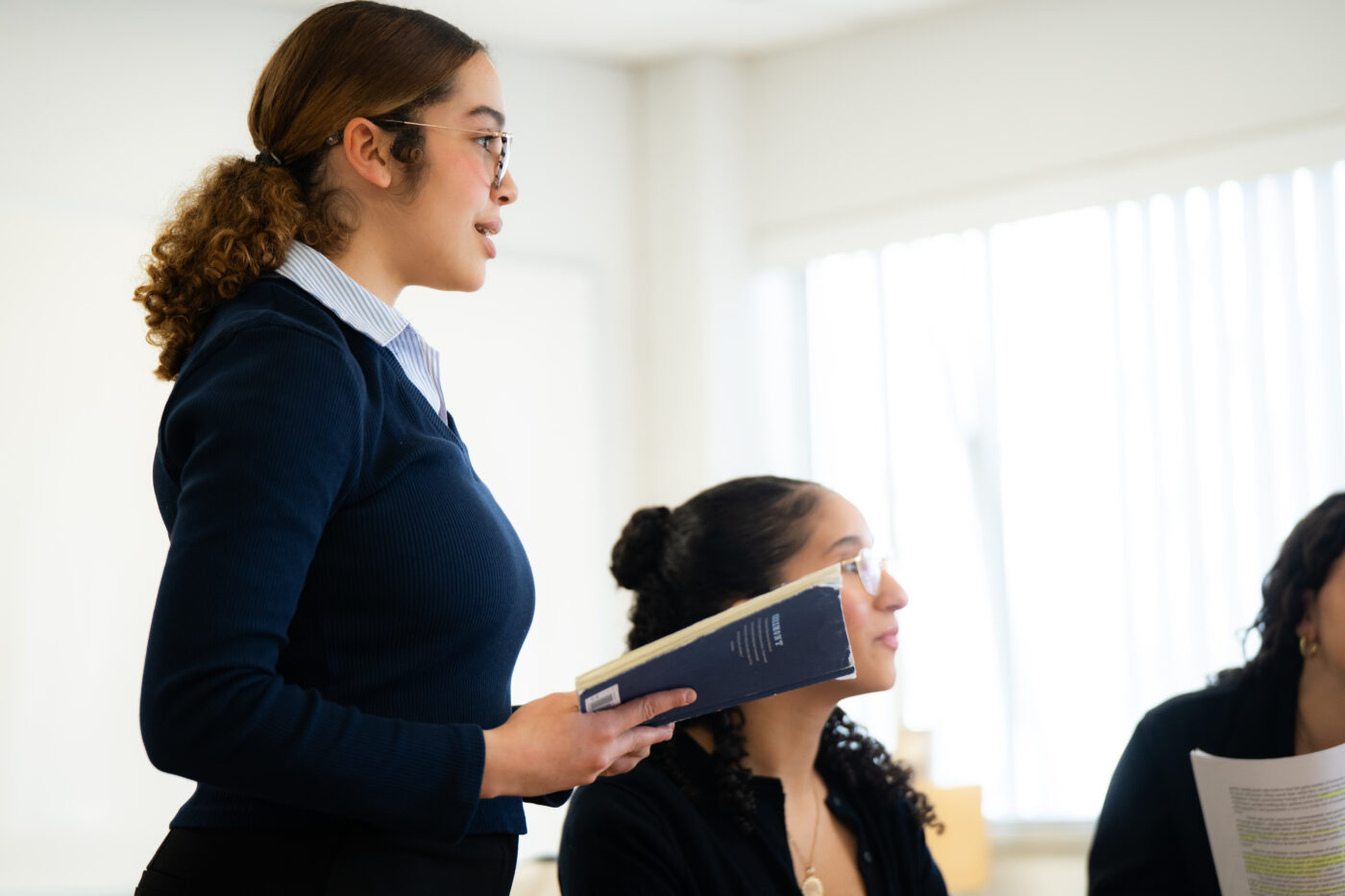

Where Might Your Double DEC Lead You?
A Double DEC prepares you for university programs in both disciplines.
The DEC in Science opens the door to numerous programs in physical sciences and mathematics. It provides a pathway to health-related fields including audiology, dentistry, kinesiology, medicine, microbiology, nursing, nutrition, occupational therapy, optometry, pharmacy, physiotherapy, and veterinary medicine. Additionally, it supports further studies in pure and applied sciences such as actuarial sciences, architecture, biochemistry, biology, chemistry, computer science, engineering, geology, geomatics, mathematics, and physics.
The DEC in Arts, Literature and Communication also prepares students for university programs in diverse fields that can lead to further studies in fields such as classical and ancient studies, communication studies, creative writing, English studies, French studies, German studies, Hispanic studies, international relations, journalism and broadcast media, linguistics and languages, literature, professional writing, public relations, teaching at the elementary or secondary levels, teaching English as a Second Language (ESL) and translation.
